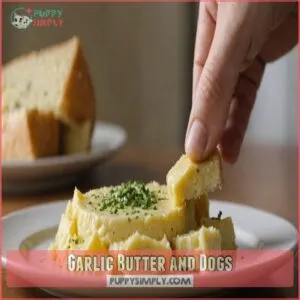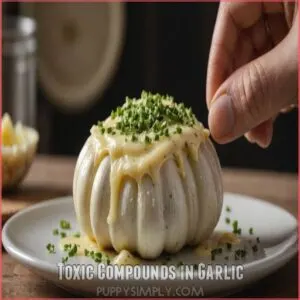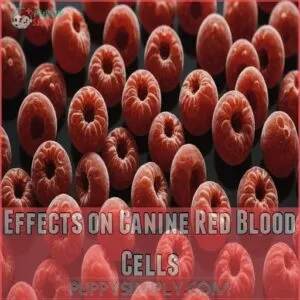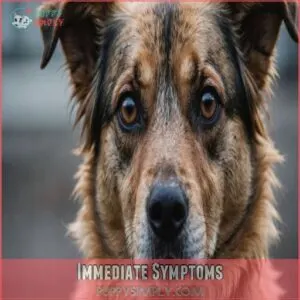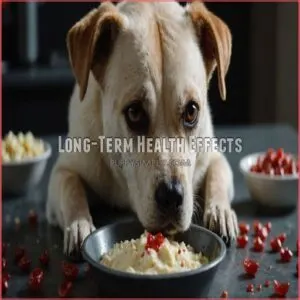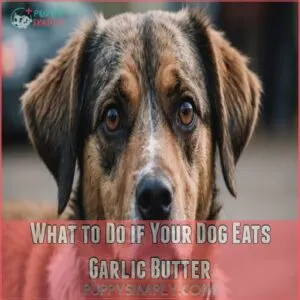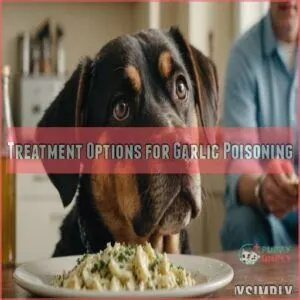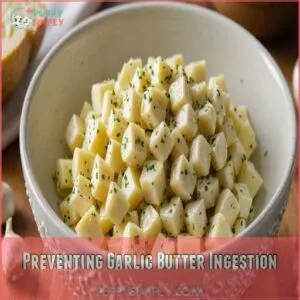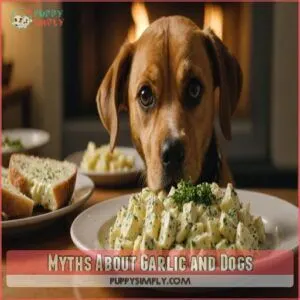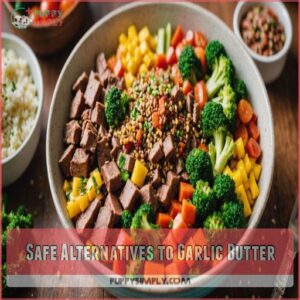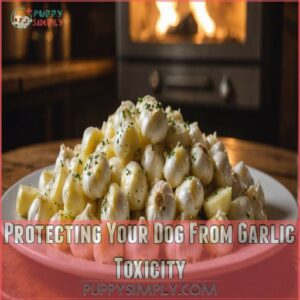This site is supported by our readers. We may earn a commission, at no cost to you, if you purchase through links.
 So, you’re wondering, can dogs eat garlic butter?
So, you’re wondering, can dogs eat garlic butter?
Well, while it might smell tempting, it’s best kept away from your furry friend.
Garlic butter is a risky snack for dogs because garlic, a key ingredient, is toxic to them.
It can lead to serious health issues, affecting their red blood cells and potentially causing anemia.
Even small amounts can be harmful, and let’s not forget the high fat content and spices in butter that aren’t great for dogs either.
It’s better to stick to treats that are safe and healthy for them.
Curious about safer alternatives? We have plenty of ideas!
Table Of Contents
- Key Takeaways
- Garlic Butter and Dogs
- The Dangers of Garlic Butter
- How Much Garlic Butter is Toxic
- Symptoms of Garlic Poisoning
- What to Do if Your Dog Eats Garlic Butter
- Treatment Options for Garlic Poisoning
- Preventing Garlic Butter Ingestion
- Myths About Garlic and Dogs
- Safe Alternatives to Garlic Butter
- Protecting Your Dog From Garlic Toxicity
- Frequently Asked Questions (FAQs)
- Can dogs eat garlic seasoning?
- Can dogs eat garlic butter shrimp?
- Is garlic in dog food safe?
- Can puppies eat garlic?
- What happens if my dog eats garlic butter?
- How much garlic is toxic for dogs?
- Can dogs eat steak with garlic butter?
- What do I do if my dog eats garlic sauce?
- Can garlic butter affect puppies differently?
- Is garlic seasoning more harmful than butter?
- Can small dogs tolerate more garlic butter?
- How does garlic butter compare to raw garlic?
- Are certain dog breeds more at risk?
- Conclusion
Key Takeaways
- Garlic butter is toxic to dogs because garlic can damage their red blood cells, leading to anemia and other severe health issues.
- Keep garlic butter away from your dog, as even small amounts can pose significant risks due to the fat content and toxic compounds in garlic.
- If your dog eats garlic butter, watch for symptoms like vomiting and lethargy, and contact your vet immediately for advice.
- Substitute garlic butter with dog-friendly seasonings and treats to ensure your pet enjoys safe and healthy flavors.
Garlic Butter and Dogs
You might think that a little garlic butter couldn’t hurt your furry friend, but think again!
Garlic, a key ingredient in garlic butter, is actually toxic to dogs, so let’s explore why you should keep it far away from your canine companion.
Composition of Garlic Butter
Garlic butter is a delightful spread for humans but risky for dogs.
It’s typically made by mixing butter with minced garlic, herbs, and sometimes salt.
The butter type, whether salted or unsalted, affects its flavor profile, but the real danger is the garlic.
Different garlic varieties might alter the taste, but they all contain thiosulfates, making garlic highly toxic to dogs.
The ingredient ratios can vary, but even small amounts of garlic can lead to serious health issues in dogs, from digestive disturbances to more severe symptoms like anemia.
Keeping such toxic foods for dogs out of reach is essential.
Why Dogs Are Attracted to Garlic Butter
Dogs can’t resist the aroma and rich flavor of garlic butter.
Its enticing smell and savory taste, loaded with fat, make it irresistible, even if it means stealing a bite off your plate.
Their keen noses are attracted to the combination of butter’s creaminess and garlic’s pungency, creating a potent mix that tempts them.
While you might chuckle at their sneaky attempts to snag a piece, it’s important to remember the risks.
Garlic toxicity in dogs is real, and what seems like a harmless nibble could lead to serious consequences.
Keep an eye out and make sure those tails wag safely.
The Dangers of Garlic Butter
If you’re considering sharing garlic butter with your dog, it’s essential to understand that, like onions, it contains toxic compounds that can be detrimental to their health, as seen in cases of onion toxicity, and know how toxic compounds in garlic damage their red blood cells, leading to serious health issues.
Even small amounts can pose significant risks, so it’s important to keep this flavorful topping far from your pet’s reach.
Toxic Compounds in Garlic
Nestled within garlic are toxic compounds called thiosulfates, which are part of the Allium family.
For instance, products like Garlic Butter Dog items often contain these compounds.
When your dog sneaks a taste of garlic butter, these sneaky compounds can cause garlic toxicity.
While thiosulfates may spice up your pasta night, for dogs, they spell danger.
These compounds can lead to garlic poisoning, where even small amounts might cause anemia or more severe health issues like organ failure.
Dogs generally can’t metabolize thiosulfates, making them especially vulnerable to these toxic compounds.
So, while garlic butter might be delicious on your dinner roll, it’s a recipe for trouble for your furry friend.
Effects on Canine Red Blood Cells
You mightn’t think a little garlic could upset your pup’s system, but the thiosulfates in garlic are a real menace for dogs.
These compounds wreak havoc on their red blood cells, leading to a condition called hemolytic anemia.
Imagine your dog’s red blood cells suddenly deciding to throw a party and pop—it’s not a fun party at all.
When red blood cells break down faster than they can be replaced, your dog can become dangerously anemic.
This isn’t just a bad day; it can spiral into severe health issues like tiredness and even organ damage.
Keep garlic out of reach!
How Much Garlic Butter is Toxic
Determining how much garlic butter is essential to know, as even small amounts can be harmful.
Consider your dog’s size and health, since toxicity varies, but always err on the side of caution and consult a veterinarian.
Factors Affecting Toxicity
Several things determine how toxic that garlic butter is to your pup.
A few key factors influence the severity of garlic poisoning in dogs.
First, your dog’s size matters; a tiny chihuahua will react differently than a Great Dane.
The garlic concentration also plays a huge role—is it a trace amount or a whole knob of garlic infused into the butter?
When did the ingestion happen? Immediate treatment is essential.
Each dog’s individual sensitivity varies; some dogs show symptoms with a tiny amount, while others seem unaffected by larger quantities.
Your dog’s general health also plays a part; an already sick dog will be more vulnerable to garlic toxicity.
Remember, even a little garlic can cause problems, so keeping garlic butter away from your furry friend is essential.
Calculating Safe Vs. Dangerous Amounts
Knowing how much garlic butter spells trouble for your dog involves several factors like garlic dose, your dog’s weight, and the garlic type.
This isn’t a "one-size-fits-all" scenario, like putting on a cozy sweater: it needs specific math.
The ingredient list is important—how concentrated is that garlic?
Then think of food form: raw garlic is much stronger than cooked.
Just a little bit can push your pet into garlic toxicity territory.
If your furry pal sneaks some garlic butter, consider their size and the amount ingested.
Pay attention to garlic poisoning symptoms and remember, even small amounts risk dog health.
Symptoms of Garlic Poisoning
When your dog has consumed garlic butter, watch for immediate symptoms like vomiting, diarrhea, and lethargy.
If left untreated, garlic poisoning can lead to more serious conditions including anemia and organ failure.
Immediate Symptoms
When your dog sneaks a taste of garlic butter, those worrisome signs of garlic toxicity might sneak up shortly after. Lethargy is often the first clue, as your usually energetic pup seems tired and sluggish, which could also be a sign of fainting or collapsing, a symptom that requires immediate attention.
Next, keep an eye out for vomiting or diarrhea, indicating your dog’s system is attempting to expel the intruder.
If you lift their lips to check the gums and they’re noticeably pale, that’s a red flag. An increased heart rate may also suggest trouble brewing. These garlic poisoning symptoms require a vet’s attention, so if your pet shows these signs, don’t delay seeking help.
Long-Term Health Effects
Beyond the immediate symptoms, garlic toxicity can lead to chronic anemia in dogs, impacting their overall lifespan.
Think of it as a slow theft of their energy over time. This sneaky culprit damages red blood cells, contributing to organ damage and compromising the immune system.
Like that persistent leak you ignore, it can cause foundational issues. You might notice behavioral changes, like lethargy or irritability, signaling distress.
Some pet owners may wonder about feeding their dogs chorizo and egg (What’s safe about can dogs eat chorizo and egg) before understanding that garlic and dogs don’t mix, highlighting dog health risks. Garlic poisoning symptoms can be caused by common ingredients found in human food, such as garlic powder in hot dogs. Garlic poisoning symptoms should never be ignored; they pose real threats to dog food safety and their long-term well-being. Stay vigilant!
What to Do if Your Dog Eats Garlic Butter
If your dog has eaten garlic butter, your first step is to prevent any further ingestion and immediately assess their condition.
"Contact a veterinarian right away," experts advise, as early intervention is critical for your pet’s health.
Immediate Actions
If your furry friend sneaks a bite of garlic butter, don’t panic, but act fast.
It’s also important to keep in mind foods like Alfredo sauce, which contains toxic ingredients and can cause severe health issues, as explained in the Alfredo Sauce Dangers.
Here’s what you should do:
- Remove the food: Get any leftover garlic butter out of reach immediately. Dogs are curious and might go for seconds.
- Keep an eye out for signs of garlic toxicity, such as signs of salt poisoning, like lethargy, or pale gums. These could indicate garlic butter dog poisoning.
- Make sure no more risky foods are accessible to avoid accidental ingestion.
- Do not induce vomiting: Unless advised by a vet, don’t try this at home, as it may cause more harm than good.
When to Contact a Veterinarian
Acting quickly is key. Even if your pup seems okay after gobbling some garlic butter, keep a close eye on them. Watch for symptoms like lethargy, vomiting, or pale gums. These are early warning signs of garlic toxicity. Breathing difficulties? That’s a serious red flag. Don’t wait for things to get worse. If you see any of these garlic butter dog symptoms, it’s time to call your vet.
Don’t delay; prompt treatment is important for a better outcome. Remember, prevention is better than cure, so secure your garlic butter! This is especially important if your dog shows signs of garlic butter dog poisoning. Getting in touch with your garlic butter dog vet immediately is a crucial step in handling pet emergencies. Early intervention can make all the difference.
Treatment Options for Garlic Poisoning
When your dog eats garlic butter, prompt veterinary attention is essential to prevent toxicity.
At home, avoid inducing vomiting and contact your veterinarian, who may recommend treatments like activated charcoal or other interventions to manage the situation.
At-Home Care
Spotting garlic butter dog symptoms feels like you’ve hit a bump in the road.
Immediate at-home care can help smooth things out while considering your next steps.
If you suspect your dog has ingested garlic butter, you can find products related to dog garlic butter poisoning at garlic butter dog products.
Here’s what you can do.
- Observe: Keep a close eye on your dog for any signs of garlic toxicity, like vomiting or lethargy. Think of yourself as a detective gathering clues.
- Monitor: Track changes in behavior and appearance, checking for pale gums or increased heart rate. It’s like watching a slow-motion mystery unfold.
- Prevent further mishaps: Clear away garlic butter sources and remind your family to mind potential risks. Prevention’s your shield, keeping further accidents at bay.
Veterinary Interventions
Veterinary interventions for garlic poisoning begin with induced vomiting and administering activated charcoal to bind the toxin.
Your vet may also provide supportive care, including intravenous fluids, to keep your pup hydrated and stabilize blood pressure.
Blood transfusions might be necessary if anemia is severe, ensuring your dog’s red blood cells are replenished.
Prognosis for recovery generally improves with prompt veterinary treatment, minimizing long-term damage from garlic toxicity.
Always consult pet insurance details to understand your coverage.
Expert veterinary advice is key to handling these emergencies, so don’t hesitate to reach out and safeguard your furry friend’s health.
Preventing Garlic Butter Ingestion
Keeping garlic butter away from your dog involves proper food storage and being aware of other culinary risks, such as the dangers of spoiled meat, including cooking toxic bacteria, and vigilant supervision.
Make sure that all garlic-containing foods are stored securely.
Train your dog to avoid scavenging, reducing the risk of accidental ingestion.
Safe Food Storage
Keeping garlic butter out of paw’s reach is smart.
Think about food safety tips with these four easy steps to make sure your dog stays safe from garlic toxicity.
1. Countertop storage: Avoid leaving garlic butter on counters; dogs can jump.
2. Fridge organization: Store butter in the fridge, preferably in the back, to keep it cool and inaccessible.
3. Pet-proof containers: Use airtight, pet-proof containers to keep aromas away and prevent accidental ingestion.
4. Secure kitchen access: Always close kitchen doors when away to prevent curious noses from turning countertops into snack bars.
Remember, garlic butter isn’t safe for dogs.
Training and Supervision
In your dog-proof adventure, keeping curious canines out of garlic butter’s reach involves both training and supervision.
Think of your kitchen as a fortress. "Teaching ‘leave it’" builds a valuable habit, a little magic trick for your pup. "Supervision during meals" is key, ensuring they’re not sneaking a taste from the floor.
Be aware that butter itself poses health risks to dogs, such as digestive upset and pancreatitis, making it essential to keep them away.
| Training Tips | Supervision Strategies |
|---|---|
| Use positive rewards | Watch during prep time |
| Consistent commands | Secure trash and leftovers |
| Short, frequent sessions | Keep counters clear |
| Patience is key | Block access to kitchen |
| Counter surfing prevention | Encourage sit/stay near meals |
Guard against that slippery garlic!
Myths About Garlic and Dogs
Let’s clear up some common misunderstandings about garlic and your furry friend.
You’ll be surprised by how many myths surround this seemingly harmless ingredient.
Knowing the truth can save your dog from serious illness.
Supposed Health Benefits
Garlic is often touted for its health benefits in humans, but for dogs, it’s a different story.
Enthusiasts might believe it aids digestion or boosts the immune system, but these myths don’t hold water.
If you’re looking for a safe alternative, you can consider substituting with Dog safe butter options.
Here’s the scoop:
- Digestion: Canines process garlic differently, and it can wreak havoc rather than aid digestion.
- Immune System: No solid proof supports garlic boosting a dog’s immune system; it’s mostly anecdotal.
- Heart Health: While antioxidants in garlic are good for human hearts, they can harm canine hearts.
- Garlic Butter Dogs: It’s not a safe flavor enhancer; opt for safer, dog-friendly alternatives.
Debunking Common Misconceptions
Many folks think garlic for digestion or as a natural repellent can benefit dogs, but that’s misleading.
While stories suggest garlic might prevent parasites, experts caution against this.
Garlic in dog treats or commercial food is formulated in minuscule amounts, posing less risk.
However, giving dogs garlic butter or any garlic-laden human food isn’t advisable.
You might believe "a little won’t hurt," but it can lead to serious garlic toxicity in dogs.
Dogs can’t process garlic the way humans can, and even small amounts can harm their red blood cells.
Keep garlic butter and dogs apart for safety.
Safe Alternatives to Garlic Butter
You shouldn’t worry about your dog’s taste buds missing out; there are plenty of safe alternatives to garlic butter.
By choosing dog-friendly seasonings and healthy flavor enhancers, you can keep mealtime both tasty and safe for your pet.
Dog-Friendly Seasonings
Spicing up your dog’s meals safely is a breeze! Try dog-safe spices to keep their tail wagging without the worry of garlic toxicity.
Here are three terrific choices:
- Turmeric – If your dog has allergies and can’t eat peanut butter, consider alternatives like SunButter for dogs, a sunflower seed spread that is safe for dogs to eat. Packed with anti-inflammatory properties, this golden spice can sprinkle some health benefits into your dog’s diet and offer an alternative to garlic butter dog health risks.
- Parsley – It freshens your pup’s breath, but also adds vitamins A and C, making it an ideal natural dog flavoring.
- Cinnamon – A pinch adds a familiar flavor and can help regulate blood sugar, offering a safe dog treat. On the other hand, some nuts like peanuts can be a safe peanut option if selected and prepared properly, adding variety to your dog’s diet. A pinch adds a familiar flavor and can help regulate blood sugar, offering a safe dog treat.
Healthy Flavor Enhancers for Canine Diets
When thinking about flavoring your dog’s meals, think outside the garlic bread box.
Dog-safe spices like parsley and basil add taste without risk.
These herbs are great natural food additives that provide vitamins and can boost your pup’s immune system.
For an extra kick, you can also try homemade treats like peanut butter pumpkin dog biscuits, made easily with wholesome ingredients and simple recipes found online, such as healthy peanut butter treats.
For an extra kick, nutritional supplements such as turmeric can enhance their meal’s flavor and offer anti-inflammatory benefits.
If you’re keen on healthy dog treats, incorporating ingredients like pumpkin or sweet potato purée ensures delightful taste with nutritional perks.
Remember, flavoring without harm is key; keep those garlic butter dog treats far from their reach to avoid garlic toxicity symptoms and guarantee their safety.
Protecting Your Dog From Garlic Toxicity
You play a key role in protecting your dog from garlic toxicity by being aware of hidden sources, like leftover takeout or snacks.
Educating your family and friends about the dangers of feeding dogs garlic-laden foods can prevent accidental poisonings.
Being Aware of Hidden Sources
Several sneaky sources of garlic lurk in your home, posing a threat to your furry friend.
Garlic in dog treats might seem harmless, but always check the ingredients.
Even seemingly innocent garlic in pet food can contain toxic compounds.
Be mindful of garlic in cooking oils, as a tiny drop can cause problems.
Pesto sauce, which often contains high amounts of garlic, is also a significant risk garlic in pesto sauce.
Never let your dog near garlic in human leftovers or garlic in table scraps.
That delicious garlic butter? Keep it far, far away.
Remember, even a small amount of garlic powder can be dangerous.
Always carefully read labels on all dog food and treats to avoid accidental exposure.
A little vigilance goes a long way in keeping your canine companion safe and healthy.
Preventing garlic toxicity starts with awareness.
Educating Family and Friends
Tackling hidden sources of garlic, like that tempting garlic butter left on the kitchen counter, is essential for safeguarding your dog.
It’s a good start, but what about educating everyone around you?
Imagine this: your friend drops by for dinner, accidentally feeding your pup some garlic-loaded goodies. We’ve all been there!
That’s why sharing knowledge about garlic dangers and food safety isn’t just smart—it’s necessary.
Make sure your family and friends know the toxicity risks.
This isn’t just talk—your dog’s health could depend on everyone’s awareness.
Time to spread the word, turning ignorance into confidence.
Frequently Asked Questions (FAQs)
Can dogs eat garlic seasoning?
Dogs shouldn’t eat garlic seasoning, as garlic is toxic to them.
It can damage their red blood cells, leading to anemia and potentially severe health issues.
If your dog ingests garlic, contact your vet right away.
Can dogs eat garlic butter shrimp?
Garlic butter shrimp may delight your taste buds, but they’re no treat for dogs.
Garlic, toxic to dogs, can cause serious health issues like anemia.
Keep your pup safe by ensuring they don’t snag even a bite.
Is garlic in dog food safe?
In dog food, garlic is usually found in tiny amounts deemed safe after testing.
It can enhance flavor and digestion, but adding extra garlic to your dog’s diet is risky and not recommended.
Can puppies eat garlic?
No, puppies shouldn’t eat garlic! Even a tiny bit can make them seriously ill. Keep garlic far away from your furry friend to keep them safe and healthy.
What happens if my dog eats garlic butter?
If your dog eats garlic butter, watch for symptoms like vomiting, diarrhea, or lethargy since garlic is toxic to dogs.
Even small amounts can cause issues.
Contact your vet quickly for advice and possible treatment.
How much garlic is toxic for dogs?
Imagine garlic as a hidden danger that’s more potent for dogs than you’d expect.
As little as 15-30 grams per kilogram of a dog’s body weight can be toxic, leading to serious health issues, including anemia.
Can dogs eat steak with garlic butter?
Steak with garlic butter isn’t safe for dogs.
Garlic is toxic and can harm their red blood cells, leading to serious health issues.
Keep that tasty steak to yourself and treat your pup to something dog-friendly instead.
What do I do if my dog eats garlic sauce?
Finding yourself in a pickle because your dog gobbled up some garlic sauce?
Act fast!
Contact your vet immediately, share details like the amount and time of ingestion, and keep garlic-laden foods out of paw’s reach.
Can garlic butter affect puppies differently?
Puppies are more sensitive to garlic butter due to their smaller size and developing immune systems.
Even small amounts can lead to anemia and other issues.
Keep garlic butter away from puppies, and consult your vet if ingested.
Is garlic seasoning more harmful than butter?
While you might assume garlic seasoning is innocuous, it’s more harmful to dogs than butter.
Garlic contains thiosulfates, toxic to dogs, causing anemia and more serious health issues, unlike butter, which doesn’t pose such risks.
Can small dogs tolerate more garlic butter?
No, size doesn’t change garlic butter’s toxicity. Even a tiny amount can harm your pup. Keep garlic away from your dog; it’s just not worth the risk!
How does garlic butter compare to raw garlic?
Just like adding fuel to a fire, garlic butter can be more dangerous than raw garlic for dogs due to its concentrated form and fat content.
Even small amounts increase the risk of garlic toxicity and health issues.
Are certain dog breeds more at risk?
All dog breeds can be affected by garlic toxicity, but smaller dogs, due to their size and weight, may be at increased risk.
Their bodies handle toxins differently, making even small amounts more dangerous for them.
Conclusion
Surprisingly, while dogs often share our love for rich flavors, garlic butter is a no-go for them.
With its toxic potential, garlic butter can seriously harm your pet, affecting their red blood cells and causing anemia.
Instead, keep your furry friend safe with dog-approved treats that pose no health risks.
Remember, a little awareness can prevent distressing situations.
When considering, "can dogs eat garlic butter?" your answer should always be a definitive no to protect your pet’s health.

